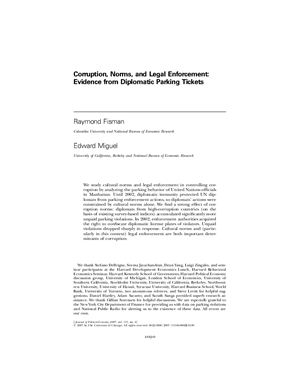Raymond Fisman from Columbia University and National Bureau of
Economic Research.
Edward Miguel from University of Califoia, Berkeley and National Bureau of Economic Research.
We study cultural norms and legal enforcement in controlling corruption by analyzing the parking behavior of United Nations officials in Manhattan. Until 2002, diplomatic immunity protected UN diplomats from parking enforcement actions, so diplomats’ actions were constrained by cultural norms alone. We find a strong effect of corruption norms: diplomats from high-corruption countries (on the basis of existing survey-based indices) accumulated significantly more unpaid parking violations. In 2002, enforcement authorities acquired the right to confiscate diplomatic license plates of violators. Unpaid violations dropped sharply in response. Cultural norms and (particularly
in this context) legal enforcement are both important determinants of corruption.
Edward Miguel from University of Califoia, Berkeley and National Bureau of Economic Research.
We study cultural norms and legal enforcement in controlling corruption by analyzing the parking behavior of United Nations officials in Manhattan. Until 2002, diplomatic immunity protected UN diplomats from parking enforcement actions, so diplomats’ actions were constrained by cultural norms alone. We find a strong effect of corruption norms: diplomats from high-corruption countries (on the basis of existing survey-based indices) accumulated significantly more unpaid parking violations. In 2002, enforcement authorities acquired the right to confiscate diplomatic license plates of violators. Unpaid violations dropped sharply in response. Cultural norms and (particularly
in this context) legal enforcement are both important determinants of corruption.

